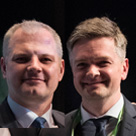
Karoly Papp (L) & Marton Fulop
CEO & COO of Docler Holding
Telecom & IT / Luxembourg
“A European live-streaming platform is something that we could conquer”
Born in 2001 in a garage by a group of young Hungarian entrepreneurs, Docler Holdings has moved its headquarters into Luxembourg and employs about 1,000 people worldwide. CEO Karoly Papp and COO Marton Fulop explain how Luxembourg is nurturing their ambitions in the ICT sector.
Why did you choose Luxembourg in the first place?
Karoly Papp: We chose Luxembourg because we felt that we had support both from government officials and the private sector. We were looking for a country matching our DNA. We were small but entrepreneurial, and enthusiastic about creating new things. We found Luxembourg matched our mentality and decided to establish ourselves here. At first the majority of our people were Hungarian, but as we grew we hired local staff, and today we have about 40 different nationalities. To attract international, highly skilled people, Luxembourg is a great place.
Can you give us some insight on Luxembourg’s strengths as an ICT hub?
Marton Fulop: As foreigners arriving to Luxembourg, our first impression was that it was a very welcoming ecosystem. What we like in Luxembourg is that it’s lack of bureaucracy, and that its regulations are more business-enablers than business blockers. You have opened doors to the business regulators when you need to discuss your problems, you have access to government officials when you need to discuss possible changes. The government is open for discussion and embraces changes; and Luxembourg overall is able to adapt to the needs of the changing market fairly quickly and effectively. It’s really agile because of its scale and lack of bureaucracy. Things can happen very fast, and that’s a key factor in the ICT sector.
What do you think are the current challenges that Luxembourg is facing in ICT?
Marton Fulop: The major challenge that ICT companies are facing is attracting IT talent – not only in Luxembourg but worldwide. Luxembourg because of its relatively small size and its recent ICT endeavor still has a lot to accomplish in that space. We see a lot of support from the government side, however there is a lot to do to promote the country and attract talents. Luxembourg is a very good place; yet 60% of our efforts when recruiting are toward promoting and selling Luxembourg; the rest of the 40% are selling our company.
Do you think enough is being done to promote entrepreneurship in the digital space?
Marton Fulop: It’s never enough, and there’s hard competition globally to attract young entrepreneurs. Luxembourg has a lot to offer, but also needs to deploy lots of efforts to raise awareness on its value-proposition. There are lots of projects and initiatives to bring people to Luxembourg, to make them discover the country and engage them to come and establish their activities here. Luxembourg is on its way; but it still has a lot to do to become truly attractive for young people. Compared to where it was 3 years ago, I see a huge change, but a lot of new things need to be done. There are a lot of small initiatives, however there also needs to be a global approach, uniting the public and private sector, when it comes to attracting either start-ups or I.T. people, but these initiatives are on their way now.
Can you tell us more about your key fields of activities and areas of expertise at present?
Karoly Papp: What differentiates our products from others on the market is our low-latency live streaming technology, which is a really unique use case. When it comes to live streaming there are lots of players on the global market, but what we offer is the high quality streaming on the low latency, which is quite unique. We have over 100 developers in Luxembourg to work on this type of product. We believe in live user experience, and created many products and verticals in that field. Recently we have acquired one start-up from Italy, Streamago, which we brought into Luxembourg. It’s a successful platform but the technology behind wasn’t the best, so we are implementing our low-latency technology product now into their product to make it more successful. When it comes to live streaming products, you have lots of products emanating from the Silicon Valley and the Asian market, but there is no real big player in Europe yet. We truly believe that creating a European live streaming platform is something that we could conquer.
What is the group’s growth strategy for the years to come?
Karoly Papp: We are looking into acquisitions, but not so much from a financial perspective, but rather from a product perspective. We want to invest into products that we believe in, and that we can afterwards integrate into our core technologies and utilize in our core products. That’s how this Streamago project has been initiated.
